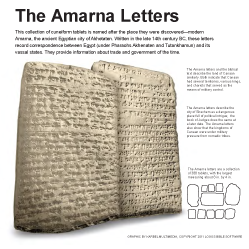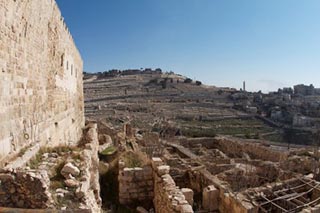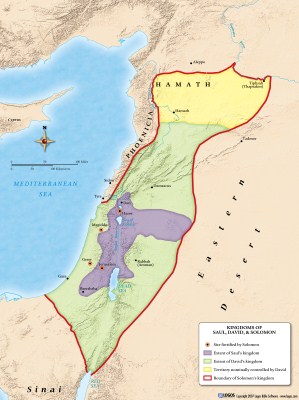1:1–36 The events in the book of Judges |
1:1 After the death of Joshua See Josh 24:29–31.
Who will go up first for us against the Canaanites to fight against them? Joshua’s death has left a vacuum of leadership. The people nevertheless assume the necessity of finishing the conquest as directed by Joshua in his farewell address (Josh 23:4–5).
against the Canaanites The native peoples of Canaan.
1:2 Judah will go up Judah is cast as the leading tribe in the same language as God’s promise to Joshua (“I have given the land into his hand”; compare Josh 24:8, 11).
1:3 to Simeon his brother Judah partners with the tribe of Simeon. This partnership may reflect the reality that Simeon’s allotment of territory fell within the territory of Judah (Josh 19:9).
1:4 the Canaanites and the Perizzites Since the Angel of Yahweh shortly condemns the Israelites for failing to expel the native inhabitants (Judg 2:1–3), the specific mention of these people groups is noteworthy (see Exod 23:23; 33:2). See note on Josh 3:10; compare Exod 3:8; Deut 7:1; 20:17; Josh 9:1.
1:6 cut off his thumbs and big toes Maiming the king in this way ensured that he would never again be able to take up arms in battle or effectively fight as a foot soldier.
1:8 Jerusalem Also called Jebus (Josh 15:63). Jerusalem (as Shalem) is mentioned in Egyptian texts from the 19th century bc and in the Amarna letters around the 14th century bc.
(as Shalem) is mentioned in Egyptian texts from the 19th century bc and in the Amarna letters around the 14th century bc.
set the city on fire There are differing biblical reports of the conquest of Jerusalem. In Judg 1:5–8, Judah defeats Adoni-bezek and then moves immediately toward Jerusalem (which is occupied by the Jebusites; vv. 21; Josh 15:8) and destroys it.
1:9 the Negev Southern Canaan and the region south of Canaan.
and the region south of Canaan.
the Shephelah The campaign following Joshua’s death (see vv. 9–20).
1:10 the former name of Hebron was Kiriath Arba Verses 5–10 parallels Josh 15:13–14, where Caleb defeats the three Anakim named here.
Sheshai, Ahiman, and Talmai Descendants of Anak, head of the Anakim giant clan that had often troubled the Israelites (see Num 13:29–33; compare Josh 15:13–14; Deut 2:10–11, 20–21).
giant clan that had often troubled the Israelites (see Num 13:29–33; compare Josh 15:13–14; Deut 2:10–11, 20–21).
 Giant Clans in the Old Testament
Giant Clans in the Old Testament
1:11 Kiriath Sepher Means “city of the scroll,” perhaps suggesting there was a library or scribal school in the city (see Josh 15:15).
1:12 Acsah my daughter See Judg 1:10; compare Josh 15:13–14.
1:13 Othniel son of Kenaz Othniel is the first judge in the book of Judges (Judg 3:9).
younger brother of Caleb Likely meant in the sense of a brother in arms or a distant relative. Othniel and Caleb are likely distantly related, since the name Kenaz is affiliated with them both (Josh 14:14). Caleb is specifically identified as a son of Jephunneh or Hezron, not Kenaz, and Othniel is never listed as a son of Jephunneh or Hezron (Num 32:12; 1 Chr 2:9, 18; compare 1 Chr 4:13; Josh 15:17).
captured it See Judg 1:10–12; compare Josh 15:13–14.
he gave to him Acsah his daughter In Biblical times, fathers often gave their daughters in the manner described here. Achsah would likely have been honored to be awarded to a war hero such as Othniel, though she was not pleased with the land gifted to Othniel by her father (see note on Judg 1:15).
1:15 upper and lower spring Achsah apparently feels her father’s gift of land, which lacks a water supply, is inadequate and undesirable. Caleb generously gives her land with two water sources.
1:16 from the city of palms A phrase elsewhere used of Jericho, but the geographical context rules that out here.
1:17 he called the name of the city Hormah This verse recalls an earlier incident recorded in Num 21:1–3, where Arad (Judg 1:16) was destroyed and the place was renamed “Hormah” (chormah); it obtained this name because it was put under the principle called (in Hebrew) cherem (see note on Josh 6:17).
1:19 they had chariots of iron The cities conquered in Judg 1:18 are on the low-lying plain, where the Canaanite chariots forced the Israelites into the hills. The Israelites, however, may have taken only the areas immediately surrounding these cities, in the hill country, where chariots were basically useless.
1:20 the three sons of Anak See v. 10 and note.
1:21 did not drive out the Jebusites See v. 8 and note.
so the Jebusites have lived See v. 8 and note; compare Josh 15:63 and note.
1:23 the former name of the city was Luz See Gen 28:19; 35:6; Josh 16:2.
1:25 they struck the city with the edge of the sword This success does not appear in Joshua. Bethel and Ai were allies, with Bethel apparently donating a military force to Ai’s defense (Josh 8:17). The two were also close geographically (Josh 8:9, 12).
1:26 the land of the Hittites The Hittite Empire was in Anatolia (now Turkey), but the designation land of the Hittites also referred to Syria, which was under Hittite control (see Josh 1:4 and note).
(now Turkey), but the designation land of the Hittites also referred to Syria, which was under Hittite control (see Josh 1:4 and note).
1:27–36 Judges 1:27–36 catalogs unconquered territory, foreshadowing that Israel has broken the covenant with Yahweh (see 2:1–3; compare Josh 24). |
1:28 Israel grew strong Manasseh’s failure (Judg 1:27) is attributed to the nation.
to forced labor Forced labor was acceptable only for inhabitants of cities outside the promised land (Deut 20:10–16). An exception was made for the Gibeonites, as they tricked Joshua into entering into a treaty with them (Josh 9), which was specifically contrary to God’s commands in Deut 20:15–16 regarding native Canaanite populations.
as they tricked Joshua into entering into a treaty with them (Josh 9), which was specifically contrary to God’s commands in Deut 20:15–16 regarding native Canaanite populations.
1:29 the Canaanites living in Gezer See Josh 16:10.
1:31 Sidon A major Phoenician city (see Josh 19:28).
1:34 come down to the plain The Danites’ failure to take possession of their original inheritance anticipates their later migration (Judg 18; Josh 19:47–48).
1:35 the Amorites Remnants of the giant clans were associated with an Amorite population (Deut 3:1–11; Amos 2:9).
population (Deut 3:1–11; Amos 2:9).

|
About Faithlife Study BibleFaithlife Study Bible (FSB) is your guide to the ancient world of the Old and New Testaments, with study notes and articles that draw from a wide range of academic research. FSB helps you learn how to think about interpretation methods and issues so that you can gain a deeper understanding of the text. |
| Copyright |
Copyright 2012 Logos Bible Software. |
| Support Info | fsb |
 Loading…
Loading…






